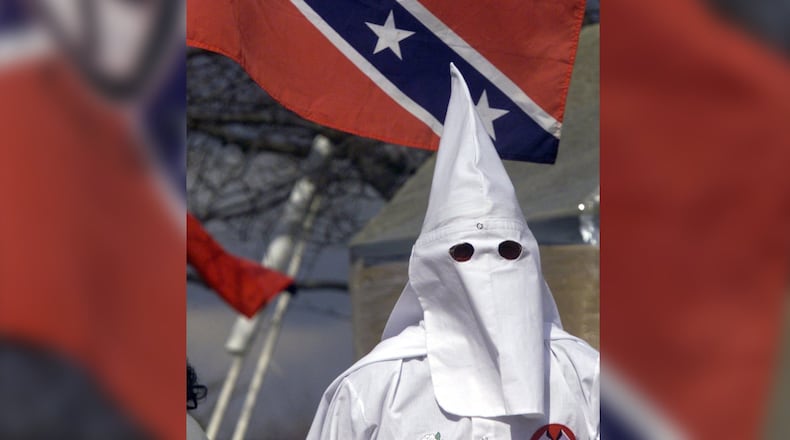The meeting Wednesday at the downtown Dayton Metro Library is part of a Montgomery County Sheriff’s Office program, Improving Modern Police and Community Trust. Scheduled every other month, the program addresses a current topic of public concern, Streck said.
RELATED: Klan rally permit approved by Montgomery County: ‘We are legally obligated’
Streck said he expects a larger-than-normal turnout and many will want to know why Montgomery County granted a permit to the Honorable Sacred Knights of Indiana to rally at Courthouse Square on May 25.
“People may just want to vent and get things off their chest,” he said. “It always comes up why we are allowing it and we’ll talk about that this is the United States. We really don’t have the ability to deny people to hold a rally or protest.”
A conciliation specialist, Daedra A. Von Mike McGhee from the U.S. Department of Justice in Detroit, will be the featured guest speaker.
Von Mike McGhee, at the department’s Community Relations Service since 2011, works to address community conflict primarily in Michigan and Ohio meeting with communities to help prevent and respond to alleged hate crimes and incidents committed on the basis of race, color national origin, gender, gender identity, sexual orientation, religion or disability, according to her LinkedIn profile.
Von Mike McGhee declined an interview Monday through a U.S. Justice Department spokesman.
Streck said people are also questioning their safety in the shadow of past white supremacist rallies like the one in Charlottesville, Va. in 2017.
“People are always fearful that something could turn violent,” he said.
In Charlottesville, violence erupted between alt-right protesters and counter protesters. White nationalist groups came in helmets, matching uniforms and used shields, batons, clubs. An Ohio man used his car as a weapon, ramming a crowd and killing 32-year-old anti-racist protester Heather Heyer. More than 70 people were injured.
MORE: Venue cites safety, turns away counter group on date of Klan rally in Dayton
The Southern Poverty Law Center, which monitors domestic hate and extremist groups, added the Indiana Klan group to its “hate map” earlier this year after noticing it become more active on Facebook and YouTube, where it posted videos of rituals including a cross-burning.
Streck said hate groups have garnered more attention the past few years.
“Social media obviously drives a lot of messages of hate groups,” he said.
Montgomery County approved the permit in February for the Honorable Sacred Knights of Indiana to rally next month at Courthouse Square. The group will be engaged in “education and public speaking,” according to the activity description on the group’s permit application.
Wednesday’s meeting is not the first to focus on how the community responds to the upcoming Klan rally.
Area groups, including an affiliation of rights organizations called A Better Dayton Coalition and the city of Dayton, have had public forums to discuss various ways to peacefully oppose the Klan group’s message.
RELATED: Groups oppose Klan rally in Dayton; call for meetings, peaceful protest
MORE: Dayton sues KKK-affiliated group ahead of downtown rally
Benjamin C. Glassman, the U.S. Attorney for the Southern District of Ohio, is also scheduled to speak Wednesday.
Glassman’s office prosecuted a Huber Heights man last year who was the first person to be convicted under the Federal Hate Crimes Prevention Act of 2009 in the district since it was enacted.
“We will not permit hate-fueled violence to gain a toehold here,” Glassman said in December when announcing the conviction of Izmir Koch.
Koch was convicted in December for assaulting a man in Cincinnati because he believed the man was Jewish and then lying to the FBI about his role in the religiously motivated assault.
Two recent incidents in which local Muslims were victimized brought calls from an area chapter of the Council on American-Islamic Relations - Cincinnati asking for local authorities and the FBI to investigate those as hate crimes.
The group recently asked Kettering to bring hate crime charges against a man who allegedly physically and verbally attacked a Muslim woman in a Meijer store on Wilmington Pike in a February incident, according to Sana Hassan, CAIR-Ohio’s Cincinnati staff attorney.
RELATED: City says assault charge correct in attack on Muslim woman
The unnamed man has been charged with simple assault. Under Ohio laws, the municipality can’t increase the charge to ethnic intimidation unless the defendant committed aggravated menacing, menacing, criminal damaging, criminal mischief, or telecommunications harassment because of the victim’s race, color, religion or national origin, said Kettering spokeswoman Stacy Schweikhart.
In another incident at the Islamic Society of Greater Dayton’s Al-Rahman Mosque, a man was seen on surveillance footage during morning prayers Feb. 28 smashing three windows out of the mosque with rocks before aiming a gun at the cameras.
“Any time that we see a house of worship being physically attacked — especially when it is a minority religious community — then the automatic assumption is that this is intended as a hate crime,” said Karen Dabdoub, executive director of CAIR - Cincinnati.
RELATED: Man points gun at Dayton mosque camera: ‘This is intended as a hate crime’
Dabdoub said CAIR has documented a significant increase in attacks on American Muslims and mosques since 2016.
Nationwide, anti-Muslim bias incidents rose 17 percent between 2016 and 2017 when 2,599 incidents were recorded to the organization.
No arrest has been made in the Dayton mosque vandalism case despite a $5,000 reward for information leading to a conviction.
Hate crimes meeting
How communities can prevent and respond to hate crimes is the focus of a public meeting by the Montgomery County Sheriff’s Office program Improving Modern Police and Community Trust.
When: 1 to 3 p.m. Wednesday, April 24
Where: Dayton Metro Library, 215 E. Third St., Dayton
About the Author

